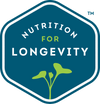Vegan Protein Sources: FAQ
Nutrition for Longevity Meals are plant-forward and showcase how to make plant-based protein aesthetically pleasingly. Our meals contain 10-20% total calories from protein, 50-60% of calories from carbohydrates, and less than 30% total calories from fat. Our macronutrient ratio is backed by over 30 years of research by Dr. Valter Longo. This is an optimal diet for minimizing disease and maximizing a healthy lifespan. Despite what many people think, there are plenty of ways to get enough protein on a vegan diet!
What Are Vegan Sources of Protein?
Nuts & Seeds (1 oz serving size)
Walnuts & Cashews =4.5 grams
Sunflower seeds= 5.5 grams
Almonds, Chia seeds, and Flaxseeds= 6 grams
Pumpkin seeds= 8.5 grams
Hemp Seeds= 9.5 grams
Legumes (1/2 cup)
Pinto beans= 7 grams
Chickpeas= 7.5 grams
Black, kidney, lentils, edamame and peas= 8 grams
Soy Products
Tofu (3 oz)= 4 grams
Tempeh (3/4 cup)= 13 grams
Seitan (3 oz)= 19 grams
Grains (1/2 cup cooked):
Quinoa= 4.5 grams
Oats= 3 grams
Brown Rice= 3 grams
Amaranth= 4.7 grams
Millet= 3.5 grams
Spelt= 6 grams
Teff= 4.9 grams
Fruits & Vegetables
Broccoli= 2.5 grams (1 cup raw)
Sweet Potato= 2 grams (1 medium sized)
Artichoke= 3 grams (1 small)
Spinach=2 grams (3 cups raw)
Banana=1.5 grams (1 medium)
Blackberries= 2 grams (1 cup)
Guava= 4.5 grams (1 cup)
Nondairy Milk (1 cup)
Soy milk: 6 grams
Pea milk: 8 grams
Do Vegan Protein Sources Contain All Essential Amino Acids?
Amino acids are the building blocks of proteins. While your body can make some of them, 9 have to be obtained through your diet, referred to as “essential amino acids”. These include:
- Histidine
- Isoleucine
- Leucine
- Lysine
- Methionine
- Phenylalanine
- Threonine
- Tryptophan
- Valine
Animal proteins like fish, dairy, beef, and eggs are considered “Complete proteins” as they contain all 9 essential amino acids.
Some plant protein sources are incomplete, as they are missing one or more of these 9 essential amino acids, but that doesn’t mean you can’t get all the amino acids needed from a plant-based diet.
Are there any complete plant-based protein sources?
Grains: Quinoa, Amaranth, Buckwheat, Ezekial Bread
Soy: Tofu, tempeh, and edamame
Seeds: Hemp Hearts and Chia seeds
Other: Spirulina (blue-green algae sold in powdered form and makes a beautiful colored smoothie!) and Nutritional Yeast
What are “complementary proteins?"
Complementary proteins are two incomplete protein sources that, when eaten together, provide a complete protein source. Rice and beans is an example of this. Rice is low in lysine, but beans are higher in lysine. Together they provide all the necessary amino acids to make up a complete protein.
Other examples of complete protein sources when consumed together:
- Pita bread & hummus
- Peanut butter sandwich
Can I Get Enough Protein on a Vegan Diet?
Dr. Longo recommends 0.31-0.36 grams of protein per pound of body weight per day for those under 65 years of age. Protein intake should be increased by 10-20% after age 65 to prevent lean muscle loss.
For an individual <65 years of age at 150 lb: This is ~46-54 grams
>65 years of age: Additional 5-10 grams/day.
Examples of 60 grams plant protein/day:
Breakfast: Oats
½ cup oats
½ cup almond milk
1 Tbsp chia seeds
½ cup blueberries
Snack: Boost Blend smoothie
2 Tbsp Lean Green Boost Blend, 1 cup almond milk, ½ frozen banana
Lunch: N4L Farm Bowl
Snack: ½ cup roasted chickpeas
Dinner: N4L Sweet Potato Chili


